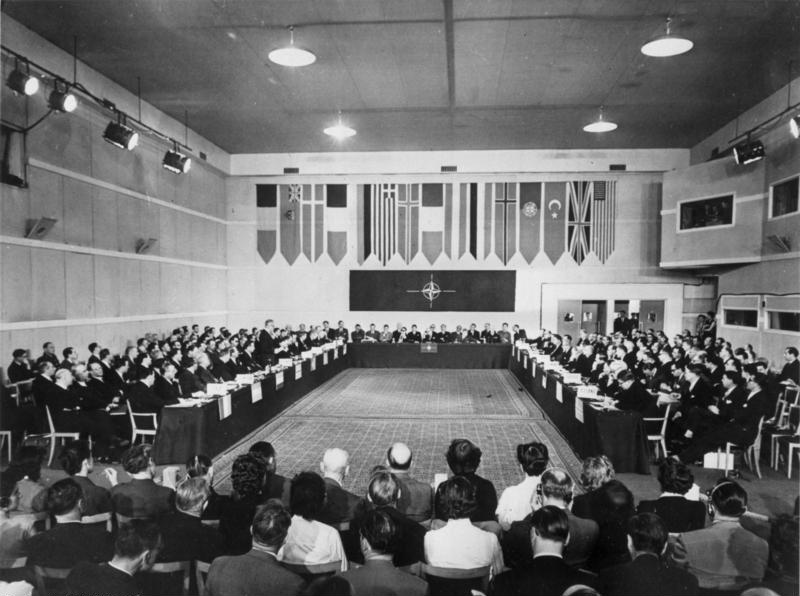Beyond Location: Germany’s Debate on NATO’s Nuclear Sharing Agreement
 West Germany joins NATO in 1955 Photo: Bundesarchiv
West Germany joins NATO in 1955 Photo: Bundesarchiv
A recent controversy about US nuclear weapons stationed in Germany has rekindled the debate about Germany’s role in NATO’s nuclear sharing. In a discussion hosted by Atlantik-Brücke, Lieutenant General Ben Hodges, former Commanding General of the United States Army in Europe, and Professor Götz Neuneck, physicist and expert on arms control, took a look at the larger picture.
The German debate on NATO’s nuclear sharing agreement is not new. Germans’ hesitations with regards to the topic sometimes appear to lack in rationality. Professor Neuneck observed: “The current debate works on fears and emotions, but not in consideration of the wider context, facts, or the weighing of alternatives.” It also does not consider the effects on the cohesion of the Alliance and the credibility of NATO’s nuclear deterrent.
“The current debate works on fears and emotions.” Götz Neuneck
General Hodges emphasized: “Germans need to regain trust in themselves, because it seems that Germany doubts itself: it’s foreign and security policy is timid, and often seems like cherry-picking. It is time for Germany for a much larger debate about its foreign, security, and defense policy.” Another point that was raised in the discussion was that the arguments being exchanged are those that dominated the debate during the Cold War, while the technological and political circumstances have changed profoundly since. Of particular concern in this respect are violations and withdrawals from the non-proliferation agreements that have provided strategic stability and greatly reduced the risk of nuclear war. While the view that the non-proliferation regime is in dire need for adaptation is widely shared, the trend to further undermine these regimes and increase the sharp end of deterrence, the second pillar of NATO’s strategic duality captured in the Harmel doctrine is hardly visible: diplomacy.
“German doubts in the Alliance can and will be exploited.” Ben Hodges
For the German debate, all these aspects ought to be considered. Instead of picking and choosing in its foreign and security policy, Germany ought to consider the entire spectrum. To this end, a much wider review of Germany’s foreign, security and defense is required, a review that is careful to not rely solely on fears and emotions, is serious about its intent, and about leading transparently. General Hodges warned: “German doubts in the Alliance can and will be exploited by the adversaries.”
Professor Neuneck provided an outlook for a more constructive approach to a shared foreign and security policy: “A key initiative is the extension of New START and much more efforts to preserve the nuclear Arms Control architecture. A new arms race must be prevented through the much less expensive instruments of arms control, talks on strategic stability and reanimating treaties. This gives all parties more confidence, predictability and stability without spending gigantic amounts of money.”
The discussion was moderated by Cathryn Clüver Ashbrook, Belfer Center for Science and International Affairs, Harvard Kennedy School.
